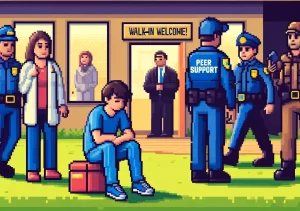
The Overdose Crisis: A Personal Perspective
In the United States, the devastating impact of drug overdose is a stark reality for millions. Since 1999, over a million lives have been lost to drug overdose, and the ripple effects of these tragedies extend far beyond the individuals who succumb to addiction. This blog explores a recent study that reveals the personal toll of drug overdose on the American population and highlights the urgent need for policy change.
Understanding the Overdose Crisis
The study, conducted in March and April 2023, surveyed 2,326 U.S. adults to understand the magnitude of personal overdose loss—defined as knowing someone who died of a drug overdose—and its policy implications.
The findings are startling: 32% of respondents, or approximately 82.7 million U.S. adults, reported knowing someone who died from a drug overdose. This statistic underscores the widespread nature of the overdose crisis, touching nearly one-third of the population.
Personal Overdose Loss: Who is Affected?
The survey revealed that personal overdose loss is prevalent across various demographic groups but is especially common among individuals with lower incomes. Among those earning less than $30,000 annually, 39.9% reported knowing someone who died of an overdose, compared to 26% among those earning $100,000 or more. This data suggests that socioeconomic factors play a significant role in the overdose crisis, with economically vulnerable populations bearing the brunt of the epidemic.
Moreover, personal overdose loss does not discriminate by political affiliation. The study found no significant difference in overdose loss across Democrats, Republicans, and independents. This indicates that drug overdose is a bipartisan issue affecting individuals across the political spectrum.
The Human Impact of Overdose Loss
The loss of a loved one to drug overdose is more than just a statistic. It leaves a profound and lasting impact on the bereaved. Family members, friends, and acquaintances of overdose victims often experience financial strain, emotional distress, and social isolation. The stigma associated with drug addiction can exacerbate these challenges, making it difficult for the bereaved to seek support and openly grieve.
One significant finding of the study is that individuals who have experienced personal overdose loss are more likely to view addiction as an important policy issue. This suggests that those directly affected by the crisis are more motivated to advocate for policy changes that address addiction and support those struggling with substance use disorders.
Mobilizing for Policy Change
The study’s findings highlight the potential for mobilizing the large portion of the U.S. population that has been affected by overdose loss to drive policy change. Given that 32% of adults have experienced this loss, there is a substantial base of individuals who could advocate for more comprehensive and compassionate addiction policies.
Addressing addiction as a policy priority requires a multi-faceted approach. Key areas for policy intervention include:
- Expanding Access to Treatment: Ensuring that individuals struggling with addiction have access to affordable, high-quality treatment is crucial. This includes increasing funding for treatment programs and reducing barriers to care.
- Harm Reduction Strategies: Implementing harm reduction strategies, such as needle exchange programs and supervised injection sites, can help reduce the risk of overdose and the spread of infectious diseases among people who use drugs.
- Public Education Campaigns: Raising awareness about the dangers of drug use and the signs of overdose can help prevent substance use disorders and save lives. Public education campaigns can also reduce the stigma associated with addiction, encouraging more people to seek help.
- Support for the Bereaved: Providing resources and support for those who have lost loved ones to overdose can help mitigate the emotional and financial impact of these losses. This includes offering counseling services and support groups specifically for individuals affected by overdose loss.
A Call to Action
The overdose crisis is a public health emergency that requires immediate and sustained action. By mobilizing those who have experienced personal overdose loss, we can build a powerful coalition to advocate for meaningful policy changes. This effort must transcend political affiliations and focus on the shared goal of reducing overdose deaths and supporting those affected by addiction.
Share with others in the comments.
- Have you or someone you know been affected by the overdose crisis? How has this experience shaped your views on addiction and policy?
- What do you believe are the most important steps policymakers should take to address the overdose crisis and support those affected by addiction?
Become a Health Innovator – Get Weekly Updates!
Stay at the forefront of public health with “This Week in Public Health.” Each issue updates you on the latest in research, community health, and advocacy. This newsletter is your tool for being an informed and active member of the health community. Subscribe for free and join a group dedicated to making a real difference in public health.



